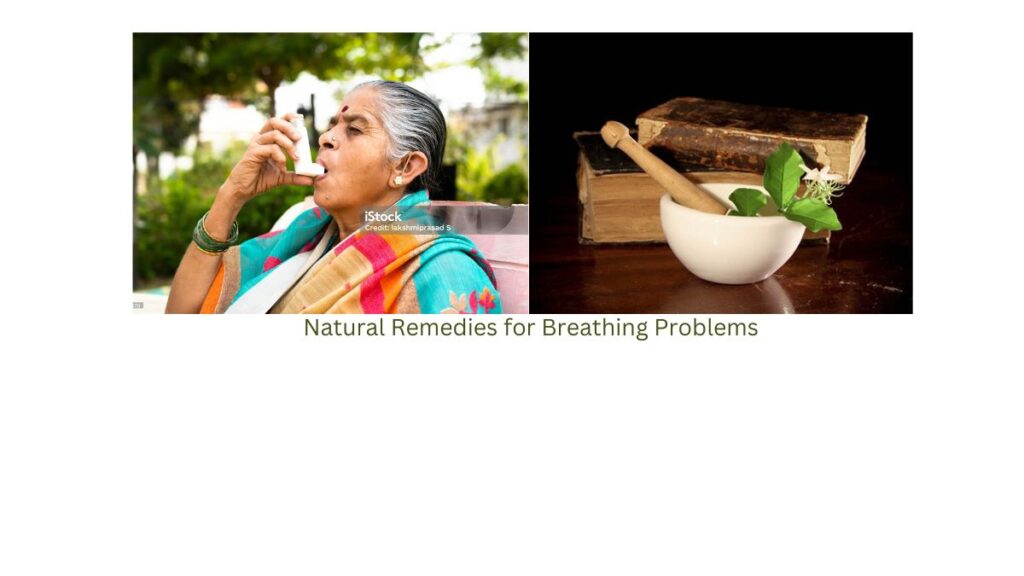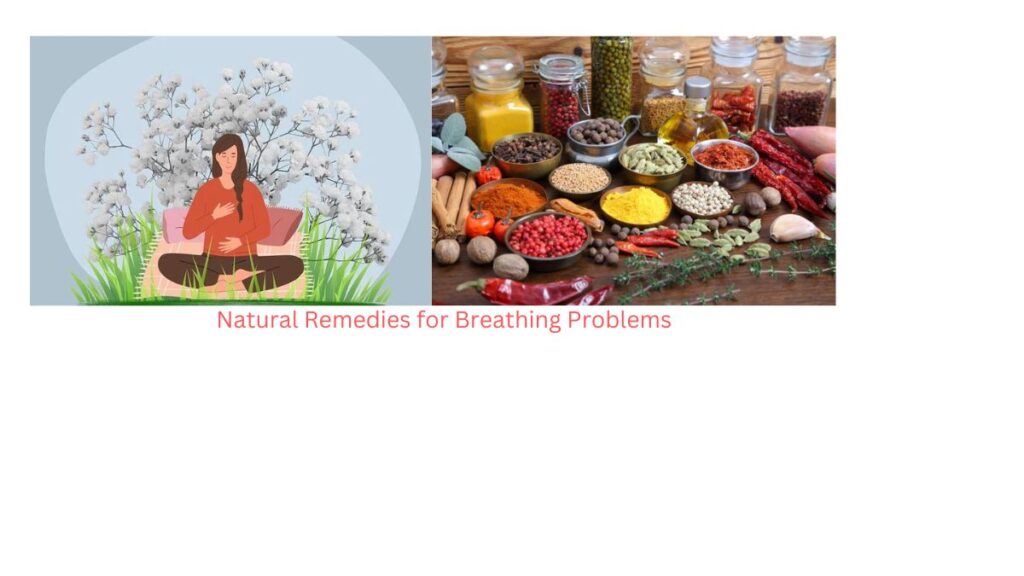Introduction:-
Natural Remedies for Breathing Problems: Your Ultimate Guide

In today’s fast-paced world, many individuals grapple with breathing problems, whether due to environmental factors, allergies, or other health issues. Seeking relief through natural remedies can be a holistic and effective approach. In this ultimate guide, we’ll explore a variety of natural solutions to help you breathe easier and enhance your respiratory well-being.
What are the reasons for breathing problems?
Breathing problems can be caused by various factors, ranging from temporary issues like allergies or infections to more serious, chronic conditions. Here are some common reasons for breathing problems:
- Respiratory Infections:
- Common Cold and Flu: Viral infections can lead to congestion and respiratory distress.
- Pneumonia: Bacterial or viral infection causing inflammation of the air sacs in the lungs.
- Allergies:
- Hay Fever (Allergic Rhinitis): Inflammation of the nasal passages due to allergens.
- Asthma: A chronic condition where airways become inflamed and narrow in response to triggers.
- Chronic Obstructive Pulmonary Disease (COPD):
- Chronic Bronchitis: Inflammation of the bronchial tubes.
- Emphysema: Damage to the air sacs in the lungs.
- Environmental Factors:
- Exposure to Pollution: Air pollution, including smog and particulate matter, can affect respiratory function.
- Occupational Exposure: Certain workplaces with airborne irritants can contribute to breathing problems.
- Smoking and Tobacco Use:
- Smoking is a major cause of respiratory issues, including chronic bronchitis and lung cancer.
- Heart Conditions:
- Heart Failure: The heart’s inability to pump blood effectively can lead to fluid accumulation in the lungs.
- Coronary Artery Disease: Reduced blood flow to the heart can impact oxygen supply to the body.
- Anxiety and Stress:
- Emotional factors can contribute to shortness of breath, particularly in individuals with anxiety disorders or panic attacks.
- Obesity:
- Excess weight can put pressure on the diaphragm and chest, making breathing more difficult.
- Pulmonary Embolism:
- A blood clot that travels to the lungs can cause sudden difficulty in breathing.
- Interstitial Lung Disease:
- Various lung diseases that cause scarring of lung tissue, reducing lung function.
- Neuromuscular Disorders:
- Conditions affecting the nerves and muscles involved in breathing can lead to respiratory problems.
- Sleep Apnea:
- Intermittent cessation of breathing during sleep, often due to airway obstruction.
- Gastroesophageal Reflux Disease (GERD):
- Stomach acid flowing back into the esophagus can irritate the airways and cause breathing difficulties.
- Anemia:
- Reduced red blood cell count can lead to decreased oxygen-carrying capacity.
It’s important to note that this list is not exhaustive, and individual cases may involve a combination of factors. If you’re experiencing persistent or severe breathing problems, it’s crucial to consult with a healthcare professional for a thorough evaluation and appropriate diagnosis.
How to get rid of breathing problems? Is there any home remedy?
If you’re experiencing breathing problems, it’s crucial to seek professional medical advice to identify the underlying cause and receive proper treatment. However, in addition to medical intervention, there are some home remedies that may offer relief for mild respiratory issues. Here are some suggestions:

- Stay Hydrated: Ensure you drink an adequate amount of water throughout the day. Hydration helps to keep the respiratory system moist and can ease breathing.
- Use a Humidifier: Adding moisture to the air with a humidifier can be beneficial, especially in dry environments. This can help soothe irritated airways and make breathing more comfortable.
- Practice Breathing Exercises: Engage in deep breathing exercises to strengthen your respiratory muscles and improve lung capacity. Techniques such as diaphragmatic breathing and pursed-lip breathing may be helpful.
- Steam Inhalation: Inhaling steam can help alleviate congestion and open up airways. You can do this by leaning over a bowl of hot water and covering your head with a towel to trap the steam.
- Eucalyptus Oil: Eucalyptus oil is known for its decongestant properties. You can add a few drops of eucalyptus oil to hot water and inhale the steam or use it in a diffuser.
- Ginger Tea: Ginger has anti-inflammatory properties that may help reduce inflammation in the respiratory system. Drink ginger tea to soothe the throat and promote easier breathing.
- Honey and Warm Water: Honey is a natural cough suppressant and can provide relief from irritation. Mix a teaspoon of honey in warm water and drink it to soothe your throat.
- Turmeric: Turmeric has anti-inflammatory and antioxidant properties. Adding turmeric to warm milk can be a soothing drink that may help alleviate respiratory discomfort.
- Maintain a Clean Environment: Reduce exposure to allergens and irritants by keeping your living space clean. Regularly dust, vacuum, and ensure good ventilation.
- Stay Active: Regular physical activity can improve lung function and overall respiratory health. Engage in activities like walking, swimming, or yoga to keep your respiratory system in good shape.
It’s important to note that these home remedies are not a substitute for professional medical advice and treatment. If you’re experiencing persistent or severe breathing problems, consult with a healthcare professional for a thorough evaluation and appropriate intervention.
Which exercises can be effective in relieving breathing problems?
Breathing exercises can be effective in improving lung function, enhancing respiratory muscle strength, and promoting overall respiratory health. Here are some exercises that may help relieve breathing problems:

- Diaphragmatic Breathing (Deep Breathing):
- Sit or lie down comfortably.
- Inhale deeply through your nose, allowing your diaphragm to expand.
- Exhale slowly through pursed lips, allowing your abdomen to deflate.
- Practice for several minutes, gradually increasing the duration.
- Pursed-Lip Breathing:
- Inhale slowly through your nose for two counts.
- Purse your lips as if you’re going to whistle.
- Exhale slowly and gently through pursed lips for four counts.
- Repeat for several breaths.
- Abdominal Breathing (Belly Breathing):
- Place one hand on your chest and the other on your abdomen.
- Inhale deeply through your nose, allowing your abdomen to rise while keeping your chest relatively still.
- Exhale slowly through pursed lips, feeling your abdomen fall.
- Focus on expanding the lower part of your lungs.
- Segmental Breathing:
- Sit or stand comfortably.
- Inhale slowly, filling the lower part of your lungs first, then the middle, and finally the upper part.
- Exhale in the reverse order, emptying the upper, then middle, and finally the lower part of your lungs.
- Alternate Nostril Breathing (Nadi Shodhana):
- Sit comfortably with a straight spine.
- Use your thumb to close off one nostril and inhale through the other.
- Close both nostrils, hold your breath briefly, and then release one nostril while exhaling through the other.
- Repeat, alternating nostrils.
- Lung Strengthening Exercises:
- Take a deep breath in, and then forcefully exhale as if blowing out candles.
- Inhale deeply again, and exhale forcefully through pursed lips.
- Repeat several times to strengthen respiratory muscles.
- Chest Expansion Exercises:
- Stand with your arms extended at shoulder height.
- Inhale deeply, expanding your chest.
- Exhale slowly, bringing your arms back to your sides.
- Repeat several times to improve chest mobility.
- Postural Drainage:
- Lie on your back with your head lower than your chest.
- Perform deep breathing exercises in this position to help clear mucus from the airways.
- Breathing with Resistance:
- Use a handheld device that provides resistance while inhaling and exhaling to strengthen respiratory muscles.
- Yoga and Tai Chi:
- These mind-body exercises incorporate breath control, relaxation, and gentle movements, promoting respiratory health.
Before starting any new exercise program, especially if you have pre-existing health conditions, it’s essential to consult with a healthcare professional or a respiratory therapist to ensure the exercises are safe and appropriate for your specific situation. They can provide guidance tailored to your needs and help you monitor your progress.
Conclusion:
Wrap up the article by summarizing key takeaways and reinforcing the idea that natural remedies can play a significant role in managing and preventing breathing problems. Encourage readers to integrate these strategies into their daily lives for long-term respiratory health.





